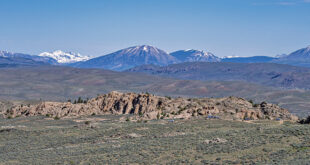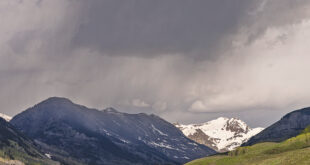The recent holiday weekend was busy—but the accents were different. It used to be that any long weekend or spring break would include an abundance of southern accents coming from polite families calling us all sir and ma’am. Texas and Oklahoma were well represented.
Lately it appears the accent is more Front Range. I’ve met people on the lifts and at the barstools from Boulder, Centennial and Denver. Those Rocky Mountain Super Passes that include three free days in Crested Butte are a magnet for skiers looking for a more authentic mountain experience than Vail. And Crested Butte certainly fits the bill. Plus the drive from Littleton is not that much more on Highway 285 than an I-70 trek during a busy weekend.
I am fortunate to be able to ski some weekdays (for research purposes of course) and the lines and energy between, say, a Thursday and a Saturday are huge. It appears we are trending toward becoming a weekend drive market and that is a little weird. If that trend continues, the community in general, and Mt. Crested Butte in particular, needs to reevaluate the infrastructure we have in place.
It used to be that the town would count on a good percentage of visitors flying in and using the public transportation to get around. People from the Front Range aren’t doing that. They are driving. And there are fewer places to park. Mt. Crested Butte was allowing parking on its roads and the school parking lot at the entrance to town came into play with a big electric sign on Highway 135 pointing people there after the mountain parking lots were full. Mountain Express put up some signs for people, directing them from the school over to the Clark’s Market bus stop.
If experienced ski resort tourists are like me, they probably continued beyond the outlying parking area in the hopes of finding something closer—so not a lot of vehicles ended up in the school lot. CBMR’s Michael Kraatz said some CBMR parking staff were sent to the school when the main lot started to fill up. They informed people how to get to Clark’s to catch the town shuttle.
In the future, it might be better to run a highly visible regular shuttle van or two directly from that lot to the ski area or at least the Four-way. That would have been polite and within our “brand” of a friendly, authentic ski resort. That is indicative of just one element of the infrastructure needs and the new thinking that comes with a shift in the community business.
FYI: Mountain Express was busy last weekend so people understand the need to park their cars and use the bus. According to transit manager Chris Larsen, the bus system carried 20,729 people over the three days. That’s compared 17,599 over the same long weekend in 2016. During January’s three-day Martin Luther King, Jr. weekend, Mountain Express counted 20,659 passengers.
The Front Range skier also appears a tad more adventurous than our southern friends. Colorado skiers seem to gravitate toward the High Lift and North Face Lift. Some of them can rip, while others perhaps should have stayed on Teocalli. The lifts, including the T-bars, had a few stoppage hiccups all weekend (at least those stuck on the Queen Sunday afternoon were given a voucher for a free day of skiing). So I’m guessing the resort is seeing the increase in use on the more expert lifts, given the shift in skier demographic. That could mean needing to keep a closer eye on those lifts and that expert terrain.
So, while the resort ultimately seems to prefer a fly-in demographic that spends more money, it is clear that Front Range marketing is successful and bringing more people here in cars from Boulder, Denver and Colorado Springs. I have even met pass holders from the I-70 resorts who want to check out Crested Butte—and they like it.
The bottom line is that if the current trend continues and the community continues to attract a drive market tourist more than a second home flyer or Tulsa visitor, the community in general needs to be aware of the different infrastructure requirements that come with that shift—and begin to seriously address those issues.
—Mark Reaman
 The Crested Butte News Serving the Gunnison Valley since 1999
The Crested Butte News Serving the Gunnison Valley since 1999





